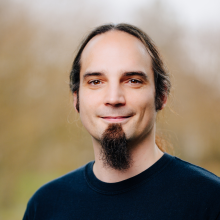
Projects from Prof. Dr. Klaus Jöns
PhoQS project: Modelling and Optimization of Photonic Wirebonds
High-quality photonic interconnects enable technological advances, both in optical data transmission and in quantum research projects. In this research project, optical broadband coupling methods will be investigated. A nano-precise 3D printer can be used to fabricate structures for photonic interfaces. Important work packages of this project ...
Duration: 09/2023 - 12/2024
Contact: Christian Kress, M.Sc., Martin Miroslavov Mihaylov, M.Sc.
LINQs: Lithium Niobate Quantum Systems - ERC Starting Grant
Quantum technologies are expected to have a transformative impact by exploiting fundamental quantum mechanical effects for technological applications such as quantum computation, quantum simulation, quantum communication, and quantum sensing. Photons are the only reliable qubit for quantum information transmission, making them an essential resource ...
Duration: 09/2022 - 08/2027
Contact: Prof. Dr. Klaus Jöns
TRR 142 - On-demand ideal photon pair generation for entanglement swapping at telecom frequencies (C09*)
The goal of this project is the demonstration of on-demand ideal photon pair generation for entanglement swapping at telecom frequencies employing quantum dots embedded in circular Bragg grating cavities. The InAs quantum dots in an InxGayAl1-x-yAs-matrix are grown by molecular beam epitaxy and the circular Bragg grating cavity will allow to tune ...
Duration: 01/2022 - 12/2025
TRR 142 - Hybrid lithium niobate on insulator quantum photonic integrated circuit (C08*)
In this project, we will explore thin-film lithium niobate on insulator (LNOI) as the material platform for quantum photonic integrated circuits. After transfer printing of cavity coupled InAs quantum dots onto a LNOI circuit, we will on-chip frequency convert the on-demand generated photons from the quantum dot using a periodically poled LNOI ...
Duration: 01/2022 - 12/2025
TRR 142 - Ultrafast coherent opto-electronic control of a photonic quantum system (B06*)
In this project we will integrate semiconductor quantum dots in field-tunable microcavity heterostructures to achieve ultrafast coherent opto-electronic control of the emitter cavity coupling. By tuning different quantum dot transitions in and out of the cavity resonance we aim to generate (i) cavity assisted two-photon emission, (ii) hyper ...
Duration: 01/2022 - 12/2026
PhoQuant: Photonic Quantum Computing - Quantum computing evaluation platform
When a sufficient number of quantum particles are interconnected, quantum computers can handle tasks that are unsolvable for classical computers. This – among other unique selling points – is a major advantage of photonic platforms: Integrated architectures and sophisticated manufacturing processes offer an enormous scaling potential. The aim of ...
Duration: 01/2022 - 12/2026
Contact: Dr. Benjamin Brecht, Prof. Dr. Christine Silberhorn
Photonic Quantum Systems Network (PhoQSNET) - Quantum communication infrastructure
Data security is critical to modern society. From personal data and identity fraud to cyber-attacks threatening the integrity of sovereign nations, the need for secure communication and data processing has never been greater. While quantum networks address some of these issues, in that they can be provably secure for many cryptographic ...
Duration: 01/2022 - 12/2027
PhoQC: Photonic Quantum Computing
Photonic Quantum Computing (PhoQC): The aim is to research the fundamentals for the realization of photonic quantum computers. For this purpose, an internationally leading research center is to be created at the University of Paderborn in perspective, in which the fields of physics, mathematics, engineering sciences, computer science and electrical ...
Duration: 11/2021 - 12/2024
Festkörperbasierte Schlüsselbauelemente für die Quantenkommunikation (Folgeprojekt) (QR.X)
Es handelt sich um ein Folgeprojekt des Vorhabens Q.Link.X, welches Prof. Zrenner mit Prof. Silberhorn und Prof. Reuter beantragt hatte. Konsortialführer ist die Ruhr-Universität Bochum. Projektleiter an der Universität Paderborn ist Prof. Dr. Dirk Reuter. Neben Prof. Reuter sind Prof. Silberhorn und Prof. Jöns beteiligt.
Duration: 08/2021 - 07/2024
Contact: Prof. Dr. Dirk Reuter
QPIC-1: Photonic Integrated Quantum Computer
Quantentechnologien werden einen transformativen Einfluss auf unsere Gesellschaft besitzen; insbesondere Quantencomputing welches den grundlegenden quantenmechanischen Effekt der Verschränkung für die effiziente Berechnung von Aufgaben verwendet, die mit einem klassischen Computer in realistischer Zeit nicht durchgeführt werden können. Zusammen mit ...
Duration: 07/2021 - 06/2025
Contact: Dr. Christof Eigner
